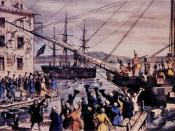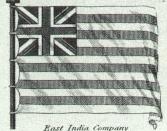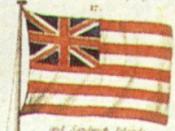On December 16, 1773 a mob of angry Colonists, led by the charismatic patriot Samuel Adams, protested the newly passed tax on tea imports. The colonists disguised themselves as Native Americans and stealthily boarded the British merchant ships that were carrying the latest shipment of tea. After boarding these ships, the Colonists dumped nearly four hundred crates of tea overboard into Boston Harbor. This famous act of defiance became known as the Boston Tea Party.
Though the Tea Act set off the Boston Tea Party in 1773, there were ten year's worth of taxes passed, prior to that historical event, which had fueled the antipathy the Colonists had for the British. After the Treaty of Paris in 1763, Britain had irrefutable control over territory east of the Mississippi River. Due to the Seven Years War Britain had accumulated heavy war debts, and as a result it began taxing its colonies to help balance them.
(Burgan, pg. 9)
The first of these taxes was the Sugar Act of 1764. This taxed all product made from sugar cane. From this tax, the famous patriot saying, "taxation without representation" arose. "After the tax, the colonists signed a nonimportation agreement, in which they pledged not to buy or import British goods that were to be taxed." (Olesky, pg. 28)
The next tax imposed upon the colonists was the Stamp Act. This law taxed everything that was printed on, such as legal documents, newspapers, and playing cards. Like the Sugar Act, the Stamp Act was heavily protested and boycotted. Town meetings gathered, as Colonists grew furious. Crowds of colonists tarred and feathered tax collectors. People such as Sam Adams formed groups like the Sons of Liberty. "In October 1765, there was a convention called the Stamp Act Congress, in which delegates from Parliament and the...


